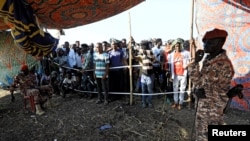Ethiopian Prime Minister Abiy Ahmed denied on Monday that a rebellious northern force his troops have battled for over a month would have the capacity to mount a guerrilla war from the mountains of Tigray.
Federal troops have captured the regional capital Mekelle from the former local ruling party, the Tigray People's Liberation Front (TPLF), and declared an end to their offensive.
But TPLF leaders say they are fighting back on various fronts around Mekelle. Ethiopia experts fear a drawn-out insurgency with a destabilizing impact around east Africa.
"The criminal clique pushed a patently false narrative that its fighters and supporters are battle-hardened and well-armed, posing the risk of protracted insurgency in the rugged mountains of Tigray," Abiy said in a statement.
"It also claimed that it has managed to undertake strategic retreat with all its capability and regional government apparatus intact. The reality is the criminal clique is thoroughly defeated and in disarray, with insignificant capability to mount a protracted insurgency."
There was no immediate TPLF response.
With communications largely down and access for humanitarian workers and media restricted, Reuters has not been able to verify claims from all sides on the state of fighting.
Aid needed fast
The conflict, which has its roots in Abiy's pushback against Tigrayans' past dominance of federal government and military posts, is thought to have killed thousands of people.
It has also sent nearly 50,000 refugees fleeing to Sudan, seen TPLF rockets fired into Eritrea, stirred ethnic divisions, and led to the disarming of Tigrayans in Ethiopia's peacekeeping contingency combating al Qaeda-linked militants in Somalia.
Abiy declared victory over the TPLF after federal troops captured Mekelle eight days ago, saying not a single civilian had been killed in the offensive.
However, a doctor reached in the city on Sunday told Reuters that at least 27 people - including a 4-year-old, a 78-year-old and a family of four - had died in the offensive. Two others were killed and four seriously wounded when residents blocked roads to protest looting by government forces in Mekelle, the doctor said.
Medical services in the city were at breaking point, he said.
“No light, no fuel for back up generator, no gloves, no anti-pain (medication), no antibiotics, no meals for patients and staff, no bank access - even our ambulance was taken by the soldiers,” the doctor said in a text message, asking that he and his hospital not be named for fear of reprisals.
The United Nations and aid agencies are pressing for safe access to Tigray, which is home to more than 5 million people and where 600,000 relied on food aid even before the war.
However, two senior aid officials told Reuters over the weekend that looting and lawlessness meant the region was still too dangerous to dispatch convoys.
The government says that with peace restored, its priorities are the welfare of Tigrayans and return of refugees. However, some residents, diplomats and the TPLF say clashes persist, with protests and looting also reported in Mekelle on Friday.
The TPLF dominated government for nearly three decades, until Abiy took power in 2018 and began democratic reforms.
The party accuses him of seeking to centralize power at the expense of Ethiopia's 10 regions and says Tigrayan officials were unfairly targeted in a crackdown on corruption and rights abuses. The government denies that and accuses TPLF leaders of treason for attacking federal forces in early November.





